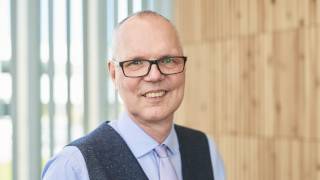In the international assessment of the university’s research undertaken in spring 2022 (TAU RAE 2022), the research carried out by our faculty was found to reach the international top of its field in many areas. The high quality of research is also demonstrated by the Centres of Excellence in Research operating at the faculty. We coordinate the Centre of Excellence in Game Culture Research and are involved in the CoE in Inversion Modelling and Imaging and the CoE in High-Speed Electromechanical Energy Conversion Systems. In addition, we participate in the UNITE Flagship, the Academy of Finland’s profiling area of Games as a Platform to Tackle Grand Challenges, TAU Imaging Research Platform and, most recently, System-on-Chip and Wireless Technology for Intelligent Machines.
Multidisciplinarity has proven to be a great strength for our faculty, and we intend to continue reinforcing it in both research and education.
Cutting-edge research to solve future challenges
In 2022, our great multidisciplinary opening was the doctoral education field of CONVERGENCE of Humans and Machines, launched with funding from the Jane and Aatos Erkko Foundation. It brings together researchers from technical sciences, humanities, and social sciences to solve new societal challenges related to human-machine convergence in co-supervised dissertation projects. We are also responding to the growing global need for microelectronics and the European Chips Act, for example, with the SoC Hub ecosystem project, which strengthens microelectronics expertise in Finland, innovates and brings more employees to the field thanks to strong business cooperation, two professors of practice and international and national funding.
More efficient energy use, carbon-neutral energy production and the electrification of society play a crucial role in mitigating climate change. We are studying energy and digitalisation technologies related to mobile machinery and energy communities, and Tampere University also received infrastructure funding from the Academy of Finland (FIRI) for the construction of a related research infrastructure. We are developing new methods for manufacturing electronics in a sustainable and cost-effective way, as well as 6G technology for telecommunications networks, for which we received funding for three new research projects from a joint programme of the Academy of Finland and the National Science Foundation of the United States.
In 2022, we planned a new degree programme in energy transition that will meet the need for all-round experts in the field.
Fostering social inclusion through research and education continued
The approach of an election year highlighted the research of political communications, which is one of the faculty’s focus areas in communication research. For example, the Personification of Politics in Hybrid Media project studied election-related communication on social media and in newspapers at the time of the last parliamentary and municipal elections. Another strong research spearhead of the Communication Sciences Unit is visual culture, which has been strengthened since last autumn with the Urban Visions project (Academy of Finland) and the Trust and Visuality project (EU Chanse). They form the basis for multidisciplinary research on the truthfulness and societal impact of visual information.
Fostering social inclusion through research and education continued through the joint efforts of the Language Studies, Communication Sciences and Computing Sciences Units. Tampere Accessibility Unit’s extensive online course palette offered up-to-date training in different aspects of accessibility that meets the new needs of working life. Several research projects to develop the interaction of linguistically vulnerable people in different ways also brought new research-based knowledge to the continuous development of accessibility training. As part of its practical work on accessibility and language policy, the faculty continued its interpreting activities where interpreter students simultaneously interpret their own and other faculties’ and university-level events between Finnish and English.

Jyrki Vuorinen
Dean
Find out more about the Faculty at our website.
Faculties’ statistics (pdf).
Highlights from 2022
Mary Nurminen’s doctoral dissertation on the operating environments and contexts of machine translation was awarded in Oslo.
Tampere University leads research in future car user interfaces.
All news items concerning the Faculty of Information Technology and Communication Sciences are available here.

